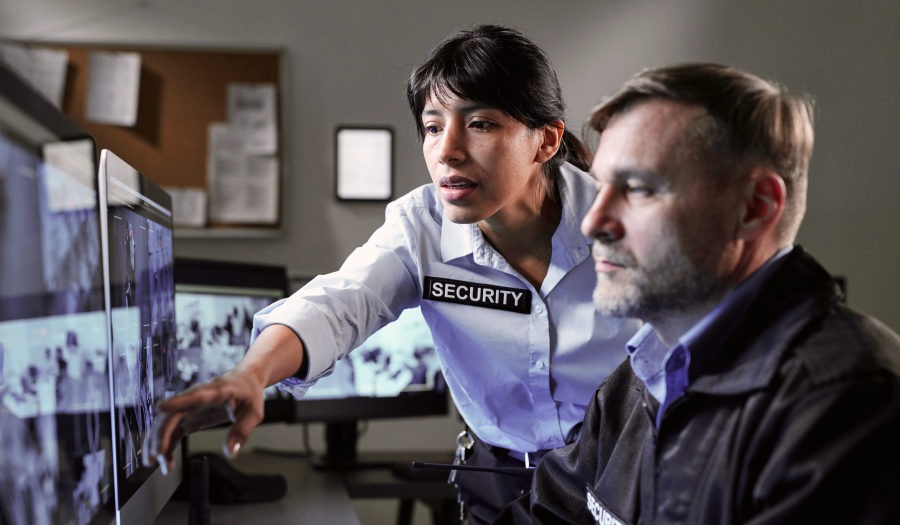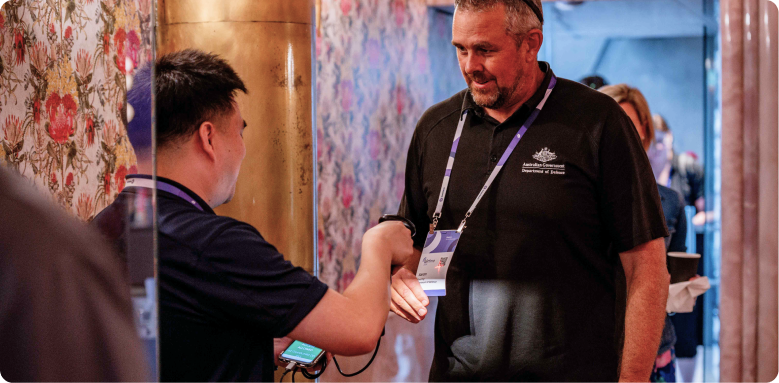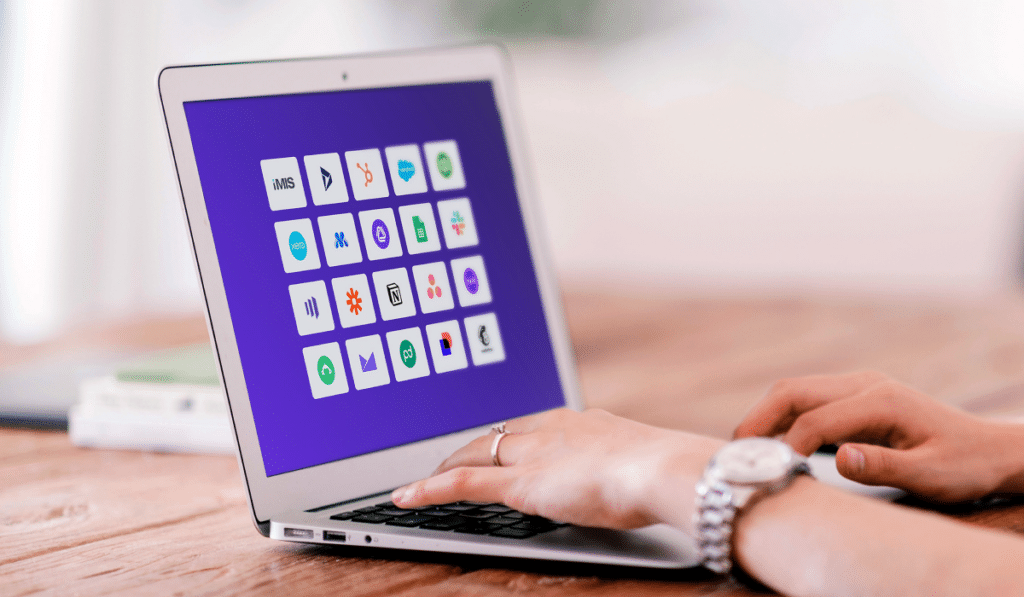Event Security Management: Best Practices for Safe & Secure Events

Event security is all about creating a safe and smooth experience for everyone involved throughout the duration of your event. It takes proactive risk management, smart planning, and the use of advanced technology to keep attendees, staff, and sensitive data secure. This means spotting potential risks, putting prevention measures in place, and staying alert throughout the event.
Even one breach – whether it’s someone sneaking in without permission or a data hack – can cause big problems, disrupt the event, and put people at risk. That’s why by focusing on strong security measures, event organizers can ensure everyone feels safe and the event runs without a hitch.
In this EventsAir guide, we will walk you through essential event security management best practices, to help you stay secure.
What is event security management?
Event security management is all about keeping your attendees, staff, and even event data safe through smart planning and proactive measures. It includes physical security, cybersecurity protocols, emergency response plans, and risk assessments to create a safe and welcoming environment.
Security doesn’t just encompass reacting to issues, it’s about staying one step ahead. A great security plan anticipates potential challenges, like unauthorized access, cyberattacks, crowd management, or even medical emergencies. The goal is to blend security seamlessly into the event, so everything runs smoothly and attendees can simply enjoy the experience.
Why is event security management important?
Event security is a critical factor in ensuring attendee safety, protecting sensitive data, and maintaining event integrity. Without proper security measures, your events are vulnerable to unauthorized access, cyber threats, crowd-related incidents, and emergency disruptions.
Let’s take a closer look at why event security management is essential:
Protects attendee safety
Crowd control, emergency response plans, and secure entry points reduce the risk of accidents, physical threats, or medical emergencies.
For example, effective crowd control and emergency response were crucial at the 2012 London Olympics, where meticulous planning prevented accidents despite hosting millions of attendees. Similarly, Coachella’s secure entry points and medical stations help ensure attendee safety each year.
Prevents cyber threats
Events store personal and payment attendee data. So, without adequate encryption, access controls, and secure platforms, this information is at risk.
Ensures compliance & liability protection
High-profile events need to follow data protection laws, like GDPR in Europe and CCPA in California, to keep attendee information safe and secure. They also need to meet strict venue safety rules, including capacity limits, emergency plans, and health and safety standards, to ensure a safe and enjoyable experience for everyone attending.
Reduces operational risks
Pre-event risk assessments, real-time monitoring, and security alerts help organizers identify and neutralize threats before they escalate.
For example, at the 2019 New York Marathon, tools like pre-event risk assessments and real-time AI monitoring made a big difference in keeping things running smoothly by managing risks like overcrowding or spotting suspicious behavior. Big events like SXSW are also using these tools to help prevent disruptions and ensure everything goes off without a hitch.
Maintains brand reputation
Security failures damage trust, deter attendees, and negatively impact future event planning.
For instance, events like TEDx take rigorous measures to prioritize data security, ensuring their attendees’ information remains safe. By doing so, they maintain their reputation as trusted and reliable organizers, building long-term loyalty and confidence among their audiences.
5 Event Security Best Practices
To run a safe, secure, and seamless event, organizers need to adopt proactive security strategies. Here are the most effective best practices for event security management.
1. Conduct a comprehensive risk assessment
Effective security planning starts well in advance of your event. The first step is identifying potential security risks, including physical threats, cybersecurity vulnerabilities, and health emergencies.
Quick action checklist:
- Evaluate venue security: Evaluate entry/exit points, surveillance coverage, and emergency routes.
- Assess cybersecurity vulnerabilities: Identify potential data breaches, phishing attempts, and unauthorized access points.
- Develop contingency plans: Map out response strategies for various threat scenarios.
- Coordinate with experts: Work with venue staff, local authorities, and cybersecurity experts to prepare for potential risks.
A detailed risk assessment ensures no security gaps, reducing the risk of disruptions.
2. Implement multi-level access control
Not everyone at an event – whether they’re attendees, staff, or vendors – needs the same level of access. By using multi-tiered security controls, you can make sure only the right people can access certain areas, event management systems, or information. This layered approach helps keep unauthorized people out, protects sensitive data, and lowers the risk of potential breaches. It’s all about creating a safer, more secure experience for everyone involved.
Best practices for access control:
- Use RFID or QR-based badging: Restrict access to designated areas based on credentials.
- Segment staff & vendor access: Ensure backstage access is limited to authorized personnel only.
- Enable digital check-ins: Secure entry points using scannable tickets, biometric verification, or facial recognition. For instance, EventsAir’s secure check-in solutions provide features to streamline entry while ensuring high-security standard with appropriate accreditation.
- Monitor restricted zones: Use geo-fencing and real-time tracking tools.

3. Strengthen cybersecurity measures
Events manage a wide range of sensitive data, including personal information such as names and contact details, payment transactions for ticketing or purchases, and proprietary content like presentations or attendee lists. Without strong cybersecurity measures in place, this data becomes highly vulnerable to threats such as breaches, phishing attacks, and unauthorized access.
These risks can have serious consequences, like financial loss, damage to your reputation, and a loss of trust with participants. That’s why strong cybersecurity is so important for event organizers.
Cybersecurity checklist:
- Use encrypted registration platforms: Ensure all attendee data is stored and transmitted securely. Fortunately, EventsAir’s encrypted registration and payment processing systems help you manage compliance with data protection regulations.
- Enable Multi-Factor Authentication (MFA): Prevent unauthorized logins with two-step verification for organizers and speakers.
- Monitor networks in real time: Ensure your software uses the latest security monitoring technology in place to detect system anomalies, unusual activity, or or potential threats (Hint: EventsAir definitely does).
- Educate attendees & staff: Train event personnel and teams to spot phishing attempts and cybersecurity risks.
4. Create a crisis management plan
To be fair, no event is completely risk-free. Unexpected situations can arise at any moment, ranging from minor inconveniences to significant emergencies. However, if you have a strong crisis management plan in place, you can ensure swift, coordinated action to mitigate potential harm.
This plan should cover a wide range of scenarios, from medical incidents like injuries or sudden illnesses to security breaches, such as unauthorized access or suspicious activity. Proper preparation helps protect attendees, staff, and the event’s overall success.
Essential crisis response steps:
- Establish an emergency response team: Assign dedicated security, medical, and communication personnel.
- Develop clear evacuation protocols: Ensure attendees, staff, and vendors know where to go in an emergency.
- Set up a real-time communication system: Use SMS alerts, PA systems, or mobile event apps to quickly inform attendees. For instance, EventsAir’s real-time communication tools–including mobile alerts via event apps, helping keep attendees informed and ensure rapid updates during emergencies.
- Run security drills & simulations: Conduct scenario-based training to prepare staff for various crises.
Being prepared for the unexpected minimizes panic, prevents misinformation, and ensures swift action.
5. Use real-time surveillance for threat detection
In event security, visibility equals control. With real-time access to who’s onsite, what sessions are active, and how attendee movement unfolds, organizers can respond faster and more effectively when something feels off.
EventsAir gives you a centralized, real-time view of your event, powered by synchronized check-in data, session access logs, and attendance tracking. This lets you monitor crowd flow, spot unusual patterns, and act quickly if something doesn’t add up.
How to strengthen your event security with real-time data:
- Track access points in real time: Monitor attendee check-ins and movement across sessions. A spike in traffic or unexpected access to restricted zones can signal the need for attention.
- Stay ahead with live dashboards: EventsAir’s real-time dashboards let you follow attendee metrics as they happen, ideal for coordinating staff and responding to issues without delay.
- Coordinate with your team efficiently: With accurate data at your fingertips, security and operations teams can stay aligned, make faster decisions, and avoid unnecessary disruptions.
EventsAir’s analytics and reporting tools provide a single source of truth for tracking the event metrics that matter, helping you reduce risk while delivering a smooth, secure experience from start to finish.
Ensure event safety with proactive security management using EventsAir
Security is the backbone of a successful event. From risk assessments and access control to cybersecurity and real-time monitoring, implementing the right event security management strategies ensures attendee safety, protects sensitive data, and prevents disruptions.
At EventsAir, we provide cutting-edge security solutions that help event organizers manage access, monitor threats, and safeguard digital and physical environments. With features like secure check-in, encrypted data handling, and real-time monitoring, we help you run events with confidence and control.
Ready to make your next event secure and seamless? Book a demo with EventsAir today!



